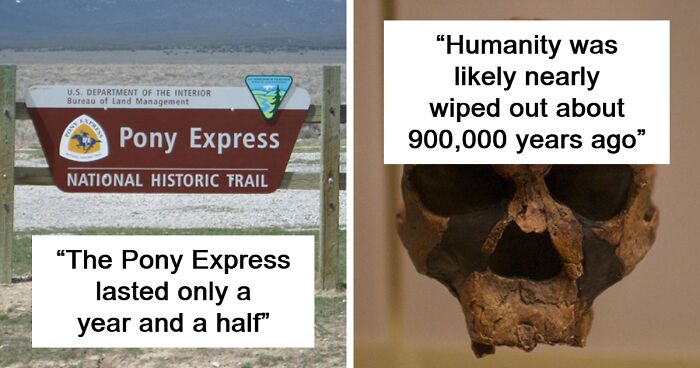Even the most well-educated of people can’t say they know everything there is to know about history; it’s an endless supply of information, fascinating stories, and curious happenings, that would take forever to familiarize oneself with.
So, while we can’t provide you with all there is to know, we can share some interesting facts, to evoke your curiosity at least. Scroll down to find some of the most fascinating little-known facts, as shared by members of the ‘Ask Reddit’ community, and see for yourself just how enthralling history can be and just how much there is still left to uncover.
Below you will also find Bored Panda’s interview with an associate professor of history at Southern Utah University, Dave Lunt, who was kind enough to answer a few of our questions about it and all sorts of historical fun facts.
This post may include affiliate links.
 During prohibition, grape concentrate bricks called Vine-Glo were sold.
During prohibition, grape concentrate bricks called Vine-Glo were sold.
On the packaging, it included a very specific warning: "After dissolving the brick in a gallon of water, do not place the liquid in a jug away in the cupboard for twenty days, because then it would turn into wine.".
 During the Irish famine the Choctaw Nation from the USA sent financial aid to them and while a small amount at the time it was seen as a great gesture in return during Covid many Irish people donated money to the Navajo Nation to help them. There’s a statue in County Cork to commemorate it as well.
During the Irish famine the Choctaw Nation from the USA sent financial aid to them and while a small amount at the time it was seen as a great gesture in return during Covid many Irish people donated money to the Navajo Nation to help them. There’s a statue in County Cork to commemorate it as well.
here is one source
and another
I am no expert, so please enlighten me. The Choctaw Nation is not the same as the Navajo Nation, right? Is there no one left of the Choctaw Nation? Or did they not need help during covid? Why not help the Choctaw instead of the Navajo? I’m not complaing, it’s great there was help. I just want to understand
 The Netherlands sends Canada 20,000 tulips every year for liberating them during WW2. The Netherlands also has a cemetery dedicated to Canadian fallen troops.
The Netherlands sends Canada 20,000 tulips every year for liberating them during WW2. The Netherlands also has a cemetery dedicated to Canadian fallen troops.
Source
Discussing the benefits of delving deeper into history, associate professor at Southern Utah University, Dave Lunt noted that there is a common cliché that we learn history in order to understand the present and the future. “As clichés go, it’s a pretty good one since the ancient Greek historian Thucydides suggested this very thing around the year 400 BCE,” he said.
“However, it’s not that history ‘repeats’ (since circumstances can never be truly identical, as Heraclitus noted when he wrote that nobody can step into the same river twice), but rather learning about history trains our minds to interpret events, to identify cause-and-effect, to anticipate ramifications and historical significance.
“Of course, there is no perfect way to predict the future, but the process of evaluating and interpreting facts in order to understand the world is good exercise for our brains, and might help us make good decisions,” the expert said.
“Besides the value of practicing what we call ‘historical thinking’, I believe it is still important to memorize things. I understand that basic facts are often just an internet-search away, but the act of memorizing—whether it’s historical facts or poetry or anything else—has positive effects on our brains.”
 Humans developed agriculture around 12000 years ago. By storing grain, huge numbers of rodents flourished. Cats showed up to eat the rodents, and humans learned that if they took care of the cats, the cats would control the rodents. Therefore, it was the invention of agriculture that led to the domestication of the house cat.
Humans developed agriculture around 12000 years ago. By storing grain, huge numbers of rodents flourished. Cats showed up to eat the rodents, and humans learned that if they took care of the cats, the cats would control the rodents. Therefore, it was the invention of agriculture that led to the domestication of the house cat.
Domestication is saying a bit much, really. Cats as they live with us today and their ancestors who didn't are genetically the same, give or take. We did not influence their species in any meaningful way, other than extreme forms of breeding, and the normal cat living in your house today is just as much a wild animal as their ancestor was before they met their first human. Humans and cats just seem to get along naturally, since cats chose us for their companions, other than any other domesticated species around. Does make me feel special... :-) /serious
 Mongolian invasion of Japan was stopped by a typhoon. When they tried again, they were stopped by another typhoon. To this day these were the only two typhoons recorded in that place.
Mongolian invasion of Japan was stopped by a typhoon. When they tried again, they were stopped by another typhoon. To this day these were the only two typhoons recorded in that place.
“I’m sure it’s different for every person, but I think learning something surprising helps us stay humble and open-minded,” Lunt told Bored Panda, suggesting that browsing random historical facts every once in a while is not a bad idea. “If we are surprised by a new fact or idea, that can help us realize that our assumptions are not always valid, and that we might need to change our minds. In a world full of strong opinions—both informed and uninformed—a little bit of humility and some open-mindedness go a long way.”
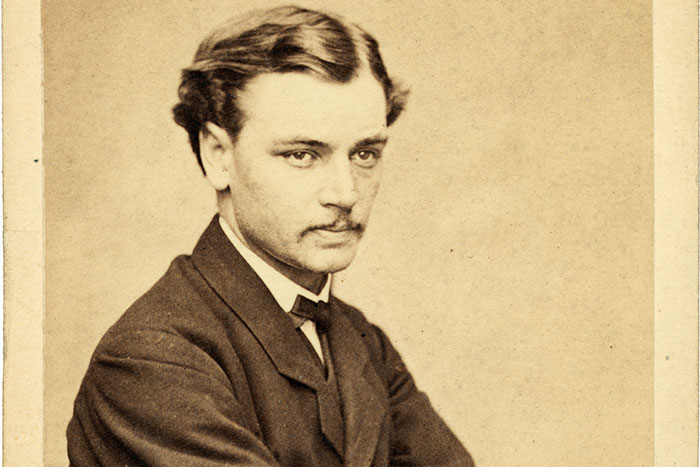 Abraham Lincoln's son (Robert Todd Lincoln) was present at three different presidential assassinations. After McKinley, he decided not to accept any more invitations.
Abraham Lincoln's son (Robert Todd Lincoln) was present at three different presidential assassinations. After McKinley, he decided not to accept any more invitations.
Really only two. He was actually present at Garfield's and McKinley's killings, but not for his father's. He was in Washington at the time, however. Robert Todd Lincoln earlier had had his life saved by someone preventing him from falling in front of a train. That someone was Edwin Booth - the brother of John Wilkes Booth, his father's later assassin.
 The Canadian-Denmark whiskey war was probably the most polite war ever. It involved a small island off the coast of Greenland. The Canadians claimed it by putting the Canadian flag and bottles of Canadian whiskey on the rock, and the Danes would replace it with schnapps and the Danish flag. Both sides reached an agreement to split the island in 2022. I'm guessing this is more well known to Canadians and Danes than some of the rest of us.
The Canadian-Denmark whiskey war was probably the most polite war ever. It involved a small island off the coast of Greenland. The Canadians claimed it by putting the Canadian flag and bottles of Canadian whiskey on the rock, and the Danes would replace it with schnapps and the Danish flag. Both sides reached an agreement to split the island in 2022. I'm guessing this is more well known to Canadians and Danes than some of the rest of us.
 Ancient Romans would put sandals on the hands of sleeping people then tickle their face so they would slap themselves.
Ancient Romans would put sandals on the hands of sleeping people then tickle their face so they would slap themselves.
In an interview with Bored Panda, Lunt shared that the facts that fascinate him the most revolve around the things that ancient people believed to be true, which today we no longer hold as factual. “It helps me remember that the things we consider today to be ‘true’ might cause future humans to chuckle at our own ignorance. For instance, there was an ancient tradition that Socrates, the great philosopher, interpreted sneezes as divine messages.”
Another example that the expert gave was the case of the Roman writer Pliny the Elder who recorded a tradition (written by an earlier writer named Caecilius) that the entrails of a hairy spider could be used as a contraceptive, if attached to a woman’s body before sunrise.
Portugal had a Death Queen and it is an insane real love story.
If you like Romeo& Juliette, search for the story of Dom Pedro and Dona Inês for the real life version of it.
Long story short: Dom Pedro was 1st in line to be the next king of Portugal so his father, the King, arranged a marriage suited for his position with a Spanish noble lady. But the future King fell in love with one of the ladies in waiting of his bride, Dona Inês.
They got married in secret and had a bunch of kids. The King didn't like that and sent his Knights to kill her. Dom Pedro went bat s**t crazy, found the Knights and killed them and ripped of the heart of one of the Knights.
Then he got the corpse of Dona Inês, put it on the throne and made the nobles pay allegiance to her by kissing her hand.
He still became King in the end. There is a lot more too this story but all of it is crazy but true facts. Portuguese Royals history is full of stuff that could be part of Game of Thrones.
Let us not forget that sometimes death does not stop revenge. Pope Stephen IV exhumed the previous Pope, dressed him up, put him on trial, cut off his blessing fingers and dumped in a river. Stephen was later dethroned and strangled in prison.
The Great Emu War in Australia (1932) - soldiers armed with machine guns fought emus to protect crops. The emus won.
You just HAD to bring that up again, huh? Sheesh !!!!!!!!!!!!!!!
 For Americans: the Coal Wars were a series of armed conflicts from the 1890s to the 1930s in which the exploitation of mining workers led to riots and then outright battles between the workers and the armed mercenaries hired by mining companies to terrorize and kill them. It culminated in the Battle of Blair Mountain in 1921, which ended when the United States Army was deployed on domestic soil to eliminate the strikers.
For Americans: the Coal Wars were a series of armed conflicts from the 1890s to the 1930s in which the exploitation of mining workers led to riots and then outright battles between the workers and the armed mercenaries hired by mining companies to terrorize and kill them. It culminated in the Battle of Blair Mountain in 1921, which ended when the United States Army was deployed on domestic soil to eliminate the strikers.
And then our nation collectively memory holed it because we wouldn’t want other exploited workers to get ideas.
My grandfather wasn't at Blair Mountain, but told me stories of the coal mining wars. He was a union organizer, and there were several assassination attempts on him by the companies. BTW, Blair Mountain was the first time that the US Army ever strafed a ground target with aircraft. The coal mining wars ended when WW2 began due to both a lot of miners enlisting, and Roosevelt abusing wartime emergency powers to put the miners firmly under the government's boot. Post war, legislation was finally passed that broke the company's grip on the miners and their families, as well as finally bringing proper roads and electrical power into Appalachia. My family still has company script in our momentos, along with other paperwork from those days. My grandfather made my uncles and us grandsons swear an oath to him that we would never work for a coal mine! It's history worth learning about, and is glossed over.
Lunt shared that the things people once believed to be factual information that are no longer true help him remember that, as much as humans are in some ways ‘universal’, the people of the past are very different from the people of the present. “Remembering that the Romans liked to eat dormice, or the Greeks exercised naked—the root of the word ‘gymnastics’ in ancient Greek is gymnos, meaning ‘naked’—helps me remember that ‘the past is a foreign country’, as L.P. Hartley wrote,” he said.
 The Chinese sparrow hunt in 1960. It was to protect crops but it allowed invasions of locusts that no longer had a predator and this caused the great Chinese famine.
The Chinese sparrow hunt in 1960. It was to protect crops but it allowed invasions of locusts that no longer had a predator and this caused the great Chinese famine.
 The reason we have coal is because trees weren't biodegradable back then, so it just underwent the geological proces and formed underground under pressure and high temperatures.
The reason we have coal is because trees weren't biodegradable back then, so it just underwent the geological proces and formed underground under pressure and high temperatures.
The fungus that breaks down trees, only evolved 40 million years ago.
Coal and oil are finite resources, and we need to move away from them and toward free and infinite sources of power. We are already having problems finding new sources of clean oil. We have to go deeper, which is expensive and time consuming, to get even the dirtiest crude, which is then expensive and time consuming to clean up to be able to use. Oil and coal—-especially coal, as it’s been burned for fuel for centuries longer than oil—-have always been responsible for polluting our air, and the mining and drilling for them are also responsible for the destruction of our land.
 Richard Nixon conspired with Saigon to win the 1968 presidential election. He interfered with the Johnson administration’s attempt at a peace treaty. This was literal treason and I feel that very few people know about it. The NYT wrote a piece about it in 2017.
Richard Nixon conspired with Saigon to win the 1968 presidential election. He interfered with the Johnson administration’s attempt at a peace treaty. This was literal treason and I feel that very few people know about it. The NYT wrote a piece about it in 2017.
“I am also interested in less-well-known historical stories that nevertheless show great drama and spark interest,” Lunt continued. “For instance, take the story of Cratesipolis, a woman who was married to a Macedonian nobleman named Alexander (not Alexander the Great).
“This Alexander occupied some Greek cities near the Isthmus of Corinth, including the city of Sicyon. Eager for independence, some warriors from Sicyon betrayed and killed Alexander, thinking they had won freedom for their city. Not so: Alexander’s wife, Cratesipolis, took control of her husband’s army, quelled the insurrection, and crucified those who had betrayed her husband.
“Women are often under-represented and many of their stories are untold in Greek history. I like reading stories like these that have somehow survived for thousands of years, and—like I pointed out above—they upend some of our assumptions (in this case about the role(s) of women in the ancient Greek world). Of course, maybe Cratesipolis was the one exception to the gender roles at the time; or maybe—and this is what I hope to be the case—ancient women had more opportunities than the sources suggest.”
 Morocco was the first country to recognize the United States of America as an independent country.
Morocco was the first country to recognize the United States of America as an independent country.
 A very recent historical fact that is weirdly not talked about as much as it should be -- Microsoft had accumulated such a big monopoly over the personal computer market through the 80s and 90s that in 1997 Microsoft was nearly broken apart by the US government. In an attempt to avoid an investigation, Microsoft invested nearly $150 million into a then-failing Apple Computer to give the US government less ammunition in a potential anti-trust case. This saved Apple from bankruptcy and helped them to become one of the biggest tech companies in history. Microsoft, however, profited off of this investment. In 2003, Microsoft sold their shares in Apple for nearly $600 million.
A very recent historical fact that is weirdly not talked about as much as it should be -- Microsoft had accumulated such a big monopoly over the personal computer market through the 80s and 90s that in 1997 Microsoft was nearly broken apart by the US government. In an attempt to avoid an investigation, Microsoft invested nearly $150 million into a then-failing Apple Computer to give the US government less ammunition in a potential anti-trust case. This saved Apple from bankruptcy and helped them to become one of the biggest tech companies in history. Microsoft, however, profited off of this investment. In 2003, Microsoft sold their shares in Apple for nearly $600 million.
In general, most of the "peaceful" movements that resulted in freedoms we enjoy today (civil rights, labor organizing, anti-war protests, the anti-colonialist movements led by Gandhi and Mandela, etc), required **significant** direct action and targeted political violence in order to succeed.
Sometimes people have no choice. Even Madiba said that he didn't WANT to use violence, but the ANC understood that only violence would get the apartheid government to listen. It's not like the National Party had a sudden attack of conscience in 1990.
Discussing the topics and periods in history people tend to be least acquainted with, the expert pointed out that in general, they are—understandably—most familiar with the history of their own locations, homes, and families. “In addition, we have the tendency to slip towards the present in our estimations and evaluations. So, in general, I would suspect that the more ancient in time, and the more remote in geography, the greater the capacity for unknown information and facts.
“I live in the United States, and I would love to learn more about ancient China and India,” he shared. “Occasionally, I have the chance to teach World History and we touch upon the ancient cultures of these places, but we can only scratch the surface of what there is to learn. Of course, I can—and I do—read and learn on my own as I can, but there are only so many hours in a day. Similarly, I wonder if people living in China and India today know less about the ancient cultures of the Americas because of the geographical distance that divides them. I don't know this; I just wonder about it.
“In the world I study, one of the best sources for little-known facts or stories is the ancient Greek writer Plutarch. Plutarch is credited with writing volumes of anecdotes, quotations, essays, and ‘fun facts’ about the ancient Greek and Roman worlds. Collectively, these works are called the Moralia.”
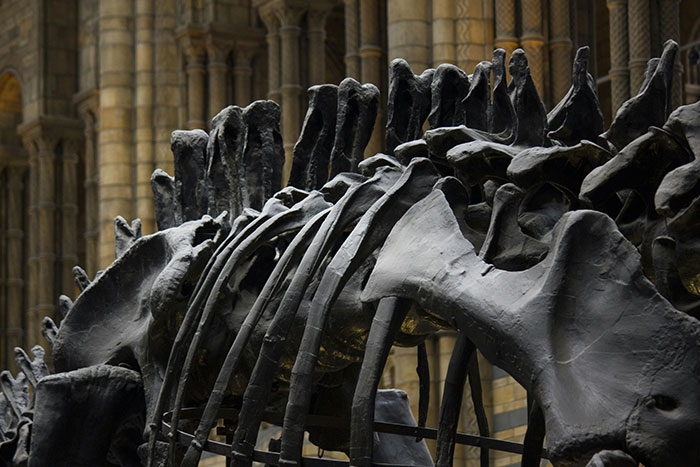 Stegasaurous died out 145 million years ago, T Rex 72-65 million years ago, the Stegasaurous was as old to the T-Rex as the T-Rex is to us.
Stegasaurous died out 145 million years ago, T Rex 72-65 million years ago, the Stegasaurous was as old to the T-Rex as the T-Rex is to us.
Grasses evolved about 70 Mya.
In the Making Of clips from the Walking With Dinosaurs series, one of the major complaints from the filmmakers was that as soon as you find a nice open bit of landscape to digitally add a dinosaur to, there's grass in it, and since there was no grass when dinosaurs were alive, they couldn't have any in the film.
 Many people know about Neanderthals, but there were also other human species as well. Homo heidelbergensis and Denisovans the other ones that we know of that existed in the time of Homo Sapiens.
Many people know about Neanderthals, but there were also other human species as well. Homo heidelbergensis and Denisovans the other ones that we know of that existed in the time of Homo Sapiens.
I thought this is common knowledge? I’ve learned about these and homo erectus and homo ergaster and homo habilis and what not at school. But especially about the neanderthals and homo heidelbergensis of course, as I live in Germany.
 Abraham Lincoln and Charles Darwin were born on the same day.
Abraham Lincoln and Charles Darwin were born on the same day.
John F. Kennedy, C. S. Lewis, and Aldous Huxley all died on the same day.
“Of course it is entertaining to learn obscure or little-known facts—the so-called ‘fun facts’—and I like the notion that these might spark curiosity and a desire to learn more. But history is more than just assembling esoteric facts. There’s definitely benefit to learning fun trivia (what historians call antiquarianism), but the analysis and interpretation are the true craft of the historian,” Lunt added.
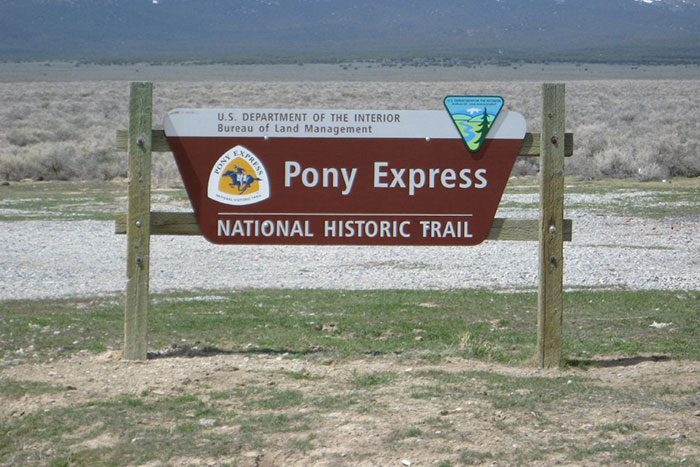 The Pony Express lasted only a year and a half.
The Pony Express lasted only a year and a half.
TheAndrewBrown: It does seem to have been marketed heavily, but it was also one of the first ways to communicate across the country. It also went bankrupt because the telegraph was invented and made it obsolete, which led to it being romanticized like a lot of other “old west” stuff was that got replaced by newer technology. But it was a huge deal during that year and a half
Yeah the Old West was but a blip in US history. Why it’s so popular is still a mystery to me
The tale of the dancing plague of 1518. In Strasbourg (modern-day France), a woman named Frau Troffea began dancing uncontrollably in the streets. Within a month, about 400 people had joined her. The phenomenon, now believed to be a case of mass hysteria or ergot poisoning, resulted in several deaths from heart attack, stroke, or exhaustion.
 Humanity was likely nearly wiped out about 900,000 years ago when our ancestors were reduced to about 1280 breeding individuals and stayed around that many for 117,000 years.
Humanity was likely nearly wiped out about 900,000 years ago when our ancestors were reduced to about 1280 breeding individuals and stayed around that many for 117,000 years.
In the 1920s Liberia had a general election, which the True Whig party won with 243,000 votes.
There were 15,000 registered voters for the election.
Bicycle face.
"In the 19th century, a mysterious condition called "bicycle face" was created to scare women from riding bicycles - **flushed cheeks, hard clenched jaw, bulging eyes** are just some of the symptoms".
Women were also told that they couldn't get on trains because it would cause their uterus to fall out. I wish I was kidding.
 Coca Cola still uses coca leaves in their formula but just for the flavor. They are the only US company that is legally allowed to import coca leaves. The processed leaves are then sold to a pharmaceutical company.
Coca Cola still uses coca leaves in their formula but just for the flavor. They are the only US company that is legally allowed to import coca leaves. The processed leaves are then sold to a pharmaceutical company.
 More people died during the production of the V2 rocket than were killed by it as a weapon of war.
More people died during the production of the V2 rocket than were killed by it as a weapon of war.
One factor was that the british managed to transmit wrong target and impact information back to the launch sides, resulting in misses of population centers
Thomas Jefferson created his own version of the Bible by hand that removed the whole first testament and any and all mentions and references to miracles and the supernatural. It’s called a Jefferson Bible and you can still get them.
The magician Harry Houdini hated people who claimed to be psychics and clairvoyants so much that he once testified before congress in an attempt to get fortune readings and things like that made illegal.
The Amazing Randi dedicated most of his professional life to debunking psychics. He even held a million dollars in trust for the first psychic that could prove their abilities. Many applied, none won the pot.
 In the early 1900s, the Tennessee Children’s Home Society was an illegal orphanage that kidnapped babies from poor households and sold them.
In the early 1900s, the Tennessee Children’s Home Society was an illegal orphanage that kidnapped babies from poor households and sold them.
If you're interested, read the book Before We Were Yours.
It was a corrupt family court judge (female) and a social worker. They did not physically kidnap, the judge would remove parental rights. Then the pair would split money on "adoption" fees. I have family from that area, during a TV movie on the story, they drove by and showed a mental hospital, implying that woman who gave birth there were used as a baby source. My comment was "hey Grandma was a nurse there."
When there are talks about colonization, the countries that always come to mind are England, Spain and France.
It's pretty weird for me that most people forget the Netherlands and Portugal as they both had very impactfull collonies around the world.
I could understand if the case was that people would refer first to the oldest ones but, if that was the case, the Portuguese colonies should be refered as well, as they go as far back as the 1500's.
South Africans certainly have not forgotten the Dutch. It's because of them that the Afrikaans language exists. People in Mozambique certainly haven't forgotten the Portuguese either; they still speak Portuguese as a language there. And I'm sure the people in the Congo haven't forgotten the Belgians; Google the terrible things they did in their colonies.
 Between 1864 and 1870 Paraguay fought a war with Brazil, Uruguay and Argentina that by some estimates killed as much as 70% of its population, with up to 90% of its adult male population dying or fleeing the country.
Between 1864 and 1870 Paraguay fought a war with Brazil, Uruguay and Argentina that by some estimates killed as much as 70% of its population, with up to 90% of its adult male population dying or fleeing the country.
Paraguay had become a very prosperous and rich country under the leadership of some enlightened dictators. Α thorn in the eye of its neighbors, who destroyed it with English loans that are still standing.
 From the 1930s to the 1970s, approximately one-third of Puerto Rico's female population underwent sterilization.
From the 1930s to the 1970s, approximately one-third of Puerto Rico's female population underwent sterilization.
https://en.wikipedia.org/wiki/Sterilization_of_Latinas Not only Puerto Rican females underwent sterilization. It's disgusting and still many claim that USA is the land of free!
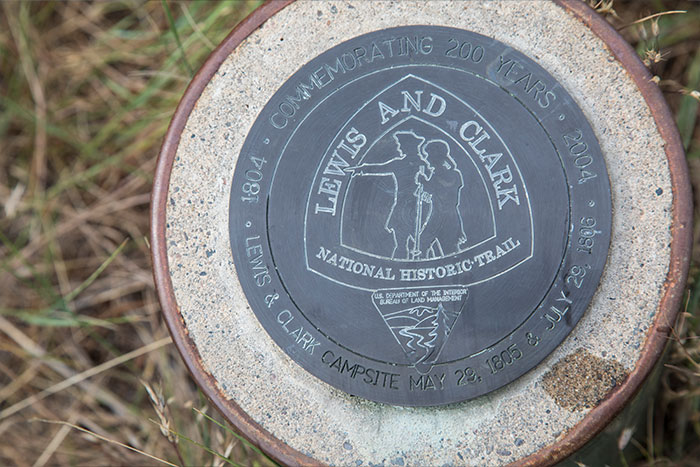 We have historic proof of the Lewis and Clark expedition because they took with them mercury pills. The mercury passed through their digestive tract and we've run into mercury 'deposits'.
We have historic proof of the Lewis and Clark expedition because they took with them mercury pills. The mercury passed through their digestive tract and we've run into mercury 'deposits'.
The Victorians used to use treadmills as a method of punishment to prisoners and make them walk on them for 8 hours everyday. It's weird we use them in gyms these days to help keep fit and never think about it like that.
They also used cranks you had to rotate as punishment, and conditioned the prisoners' meals to complete certain amount of laps. Several prisoners went insane...
Pink was originally considered a masculine colour and was only popularised as a feminine colour in the 1940s.
This "fact" is incomplete. Pastel colours have been associated with babies/small children since the 19th century, but the distinction between pink=girls and blue=boys happened in the 1940s, when the manufacturers of baby clothing specifically marketed it that way. Ironically enough, in the 1920s it was the opposite: pink was associated with boys, blue with girls.
The Romans had communal bathrooms in which they would sit in a U shape and talk about business (as you do). Keep in mind that these bathrooms were mostly used by important people within the community.
Upon finishing the drop of the deuce, they would grab a sponge on a stick, found in a barrel of water beside the toilets, wipe their poopy butt with it, and then return it to the water barrel for the next person to use.
The stick wouldn't be quite as disgusting as it sounds. They were running water toilets, so fresh water was constantly passing through. For a society that didn't know about germs, it could have been a lot worse.
 William Price
William Price
After cremating his son in 1884, he was arrested by those who believed cremation was illegal under English Law
He successfully argued that there was no legislation that specifically outlawed it, which paved the way for the Cremation Act 1902 and reintroduced Cremation into society as an alternative to burial.
I am directly related to him through my father's side of the family.
It seems many religious leaders burning so called witches and heretics thought it was ok too.
In WW2 the soviets played tango music to trapped Germans because they thought it sounded sinister.
Antarctica wasn't officially confirmed as a continent until 1820. Meaning that humans confirmed Uranus as a planet 40 years before Antarctica was confirmed as a continent.
The first woman to receive a US military pension served in the American Revolution. Her name was Margaret Corbin. .
The last person to received an American Civil War pension was Irene Triplett. She died in May 2020. Her father, Mose, was 83 at the time for her birth, and died when Irene was 8 years old. From that time, she was able to collect her father's pension as Irene had cognitive impairments which classified her as 'a helpless child of a veteran'.
United Fruit Company (now Chiquita) had the CIA create a successful coup d'état in 1954 against a democratically elected president who was left leaning. The operation was code named PBSuccess.
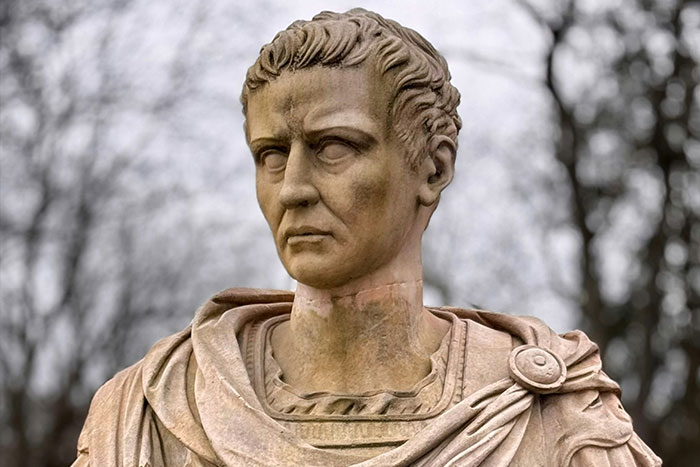 The Roman Emperor Caligula loved his horse, Incitatus, so much that he gave him a marble stall, an ivory manger, a jeweled collar, and even a house. Caligula also allegedly planned to make his trusty steed a senator before his assassination.
The Roman Emperor Caligula loved his horse, Incitatus, so much that he gave him a marble stall, an ivory manger, a jeweled collar, and even a house. Caligula also allegedly planned to make his trusty steed a senator before his assassination.
My country has many senators who are horses - or at least one end of one.
In the USA in 1900, the life expectancy was 46 years for men and 48 years for women.
On Apollo 11, Neil Armstrong broke a critical switch with his suit backpack that was needed for igniting the ascent engine. Buzz Aldren stuffed a pen into the switch to enable it to function for liftoff.
The "almost stranded on the moon by a broken switch" story is a bit exaggerated. They had a tool kit on board, if the trick with the pen didn't work, they could have unscrewed the switch from the control panel and connect the wires manually. If that didn't work, there was some redundancy in the wiring of the lunar module that would allow a (slightly more complicated) workaround to start the ascent engine without using the damaged switch.
The Catholic Church hired castrated pre-pubescent boys for centuries in order to retain the singing voice equivalent to that of a soprano, mezzo-soprano, or contralto. They banned the practice in 1878.
That American orphanages used to trick vulnerable mothers into signing away custody of their children; then sell those babies to wealthy families. Many babies died. Etc.
https://en.m.wikipedia.org/wiki/Magdalene_Laundries_in_Ireland And then there were the magdalene laundries in Ireland.
The late queen of England had two mentally disabled cousins who were abandoned in a mental hospital (Which was literally once called "The Asylum for Idiots") and never claimed as part of the family, and they were even listed as dead for 47 and 26 years, respectively, before the truth came out.
George V was euthanized against his will because they thought it was more dignified to have his death reported in the morning news than the evening.
In Medieval Germany it was common for priests and nuns to literally enter symbolic marriages to Jesus and numerous religious books from the era mention the wedding nights.
There was a species of Tortoise on the Galapagos that was never fully catalogued at the time of Darwin's expedition because it was so delicious no specimens made it back to the UK.
A drunk driver wrecked a car into the most isolated tree in the world in the Sahara desert in the 70s. Killing it.
A bus driver drove the bus into the olive tree that supposedly was the tree that Plato sat under.
Enrico Dandolo, the doge of Venice who was the first person to ever conquer Constantinople, was 90+ years old and blind when he did it. (With the help of the 4th crusade). He also go the entirety of Venice excommunicated for sacking a rival Christian city across the Adriatic.
And the Venetians basically said, "Fine with us. We can still do business."
During WW2, the USA produced so many Purple Hearts, anticipating heavy losses in taking mainland Japan, that the surplus was still being used until the late 1990s.
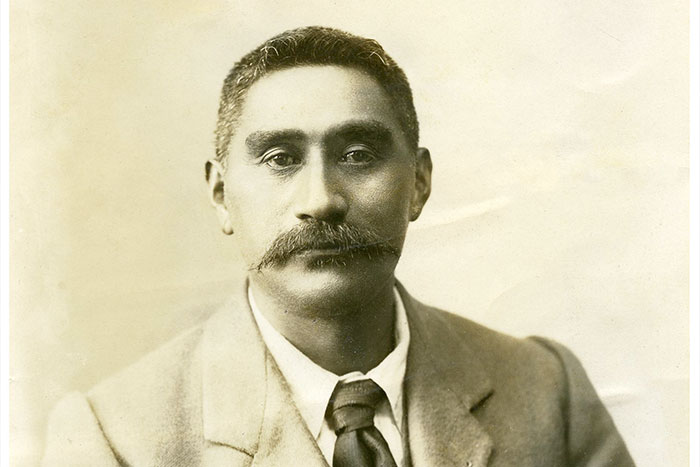 When the Waikato tribes had overextended vs Taranaki tribes the future Māori King Pōtatau Te Wherowhero realised they were being lured into an ambush and tried to call his allies back.
When the Waikato tribes had overextended vs Taranaki tribes the future Māori King Pōtatau Te Wherowhero realised they were being lured into an ambush and tried to call his allies back.
It would have turned into a rout but he took up a kō (gardening stick - he didn't even have his weapons with him) and struck down enemy chiefs in single combat repeatedly, till both sides stopped to watch, and retired for the day.
No wonder they chose him to be the first King.
The “orchestra hit” sound effect popular in 80s and 90s pop/R&B music like Janet Jackson (and more recently by Bruno Mars) is a sample from Stravinsky’s piece The Firebird. So any time you hear the orchestra hit you’re hearing Stravinsky.
The guy who negotiated the Treaty of Guadalupe Hidalgo technically had no right to complete the finalized treaty. Polk was unhappy with his negotiations and recalled him, but he ignored Polk's order and continued negotiating. Polk was displeased with the result but submitted the treaty to the Senate anyway. In the end, a divided Senate approved the treaty with an odd assortment of people supporting it for very different reasons and opposing it for very different reasons.
 The supreme court decided that Tomatoes are a vegetable not a fruit in 1893.
The supreme court decided that Tomatoes are a vegetable not a fruit in 1893.
SCOTUS should not decide technical issues. Bunch of folks who became lawyers because they were bad at math and science
On property owned by a Mr. Wilber McLean, the American Civil War's first engagement took place. In order to escape the war, he made the decision to relocate farther out into the countryside following the fight. Four years later, General Lee turned himself in to General Grant at Mr. McLean's home. That was his land, where the fight began and finished.
For over 100 years it was 100% legal to hunt members of the Church of Jesus Christ of Latter Day Saints (Mormons) in Missouri.
For context they were Abolitionists, and the state decided they were growing so fast that they might soon vote to outlaw slavery.
The reasoning is way over simplified. Morons in the early US settled in multiple places and declared the land their zion and basically declared themselves an independent nation. In some cases the robbed and killed travelers passing through. They also saw dark skin as a curse from God and were an openly racist organization that only allowed whites until the 70s and 80s. Now they are just closeted racist. Declaring open season on Mormons is wrong but pretending Mormons were despised because they were anti slavery is fiction.
The An Lushan Rebellion (755-763) caused the deaths of about 30 million people, which was equal to about 10% of the world's human population at the time.
*Cracker*, when used as a slur for white people, doesn’t refer to the food. It refers to a slave owner cracking his whip.
More than half the people who have ever died (Almost 50 Billion), are thought to of died from female mosquito bites.
That does not sound like it could be true... where there so many people before the migration out of africa? All the wars and genocides and heart attacks throughout history, flea bites carrying the black death, tuberculosis, poverty and starvation... I wouldn't doubt that's it's the leasing cause of death, but every second person who ever lived?
 The Statue of Liberty is a monument to the abolition of slavery, which is why there is a set of broken chains hidden near her feet.
The Statue of Liberty is a monument to the abolition of slavery, which is why there is a set of broken chains hidden near her feet.
That’s completely incorrect. The Statue is not a monument to the abolition of slavery at all. The broken chains explicitly represent the « liberation from oppression » that may include emancipation from slavery but above all an allusion to democracy that ends political oppression.
The Victorian Era is part of the "Modern History" period of time :)
Load More Replies...Long-windedness discourages reading. Both the writer and Lunt should learn the virtues of self-editing.
The Victorian Era is part of the "Modern History" period of time :)
Load More Replies...Long-windedness discourages reading. Both the writer and Lunt should learn the virtues of self-editing.

 Dark Mode
Dark Mode 

 No fees, cancel anytime
No fees, cancel anytime 


